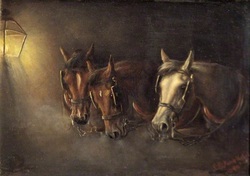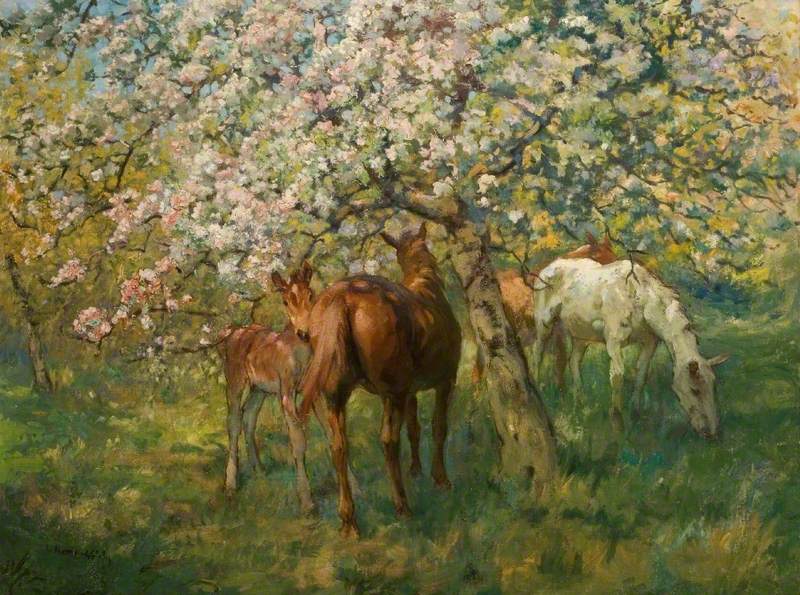 The Toilers, Kemp-Welch, BBC Collection The Toilers, Kemp-Welch, BBC Collection Anna Sewell's only novel is one of eternal morality. The story of a handsome, well-bred as well as good natured horse and his journey through Victorian Era Britain. Black Beauty, originally named Darkie, is born a dark colored colt with a white starred forehead, into a household of fair wealth, "the first place that I can well remember was a large pleasant meadow with a pond of clear water in it." His mother's name is Duchess, and she was a favorite of the master's. He called her, "Pet." When Darkie is caught by his mother running, kicking and biting with other colts of the field, she whinnies him to her side and explains to her son, that his play mates are cart horse colts and they are not of the most mannered variety. She tells him, "I hope you will grow up gentle and good, and never learn bad ways: do your work with a good will, lift your feet up well when you trot, and never bite or kick, even in play." At the age of four Darkie, receives his breaking in. He is in a very good place with a kind and sensible master, but still, he is disconcerted by the bit in his mouth and finds the weight of his master upon his back quite odd indeed. But he is coaxed and petted to quell the shock of the change. Darkie is also trained to become used to man's machines, such as trains, so he will not have to fear nor fret when at a station. Soon before their parting Darkie's mother gives him advice to last a lifetime: There are a great many kinds of men; there are good, thoughtful men like our master, that any horse may be proud to serve; and there are bad, cruel men, who never ought to have a horse or a dog to call their own. Besides, there are a great many foolish men, vain, ignorant and careless, who never trouble themselves to think, these spoil more horses than all, just for want of sense; they don't mean it, but they do it for all that. I hope you will fall into good hands; but a horse never knows who may buy him, or who may drive him; it is all a chance for us; but still I say, do your best wherever it is, and keep up your good name. Soon Darkie finds himself within the luxury of a lose box at Squire Gordon's estate. His stable mates are Merry Legs and Ginger. Merry Legs is a pert, tubby, plucky little grey dappled pony who is a fair favorite with children. Ginger is a tall chestnut beauty with a vigorous temper and a good heart. It is here, Darkie is named Black Beauty, and he is again in a good place, with practical and compassionate owners. His one wish is for liberty. To run and roll upon meadow grass as he used to when a colt. He dislikes the steel bit, the straps and only being let out of his stall when he is needed. Though, every Sunday, the family would walk to Church and the horses would be let free for exercise in a large pleasant meadow. "It was a great treat for us to be turned out into the home paddock or the old orchard; the grass was so cool and soft to our feet, the air so sweet, and the freedom to do as we liked was so pleasant - gallop, to lie down, and roll over on our backs, or to nibble the sweet grass. Then it was a very good time for talking, as we stood together under the shade of the large chestnut tree." As the times in the orchard and meadow allowed the horses room for conversation, it was in this manner Black Beauty learned about Ginger's upbringing. Within Ginger's past were some reasonable caretakers, but also many abusers. Including those so very fond of the check reign, a strap that runs from the harness, directly upon the horse's neck and attaches to the back of its head. The tighter the reign, the higher the horse's head. Check reigns were in fashion among a variety of classes, during the period, and such fashion caused much distress and suffering for the horse. Ginger rails against ill treatment and the check reign. Black Beauty's owners have never used it, so he has as of yet no personal knowledge of having his head and neck forced up. Ginger describes men as "brutes" and "blockheads" which many can be, but Merry Legs turns the sour mood around by reminding all of the good masters they have now. But, such peace and quality of life pleasantries were not to last as the mistress of the household becomes direly ill. The estate is broken up as the master and mistress depart to a more temperate climate in desperate hopes, the change in environment will remedy the lady's declining health. The horses are given to friends. Merry Legs is never to be sold as per agreement. Black Beauty and Ginger are placed with the Earl of W- at Earlshall Park, a much wealthier estate than their former home. Here the mistress is fond of the check reign and insists upon its use despite warning regarding Ginger's temper. One morning the mistress demands the reigns to be up far too tightly and Ginger lashes out, kicking her way out of the carriage harness. Black Beauty, now named Black Auster, is accidently kicked in the bargain and the lady misses the Duchess's garden party. All for the check reign. Many ill treatments of the horses come from knowing ignorance such as use of the check reign or else from over exhausted systems, exemplified by low rung cab drivers who can hardly care for themselves, much less the horses. And the horses are never preferred above people. Black Auster is sold from the Earl of W-'s estate, when his knees are broken by a drunken rider and the hair burned off as part of the medical treatment. The look of his knees causes him to fall into the middle class. He is first sold as a job horse. A client of the renting stable, takes a liking to Black Auster's quality and recommends him to a friend of his, Mr. Barry, a businessman whose doctor has recommended he take on a horse for exercise. Beauty would likely have had a well off home with Mr. Barry as the accommodations of the businessman's stables were sound including food of high quality. But his new owner had the misfortune of hiring two irresponsible grooms in a row; one who stole corn and the other time, by being lazy and not cleaning out the stall. So, in disgust and likely embarrassment, Mr. Barry sold the horse. Beauty then finds a home in the city of London, with a good natured middle rung cab driver with a kind family. He is worked very hard, as all cab horses are, but is treated well. On passing, Beauty sees Ginger again. She is used up as a low cab horse and no longer fights for herself anymore. Her wind had been ruined by the check reign and she kept being sold lower down, until she found herself reaching for a piece of straw that had blown from Beauty's feed. She recognizes Beauty, but he cannot believe it is her at first, as she is now a tired creature, with buckling joints and glazed, empty eyes that are hoping for death. She does not kick or jump when she is mistreated anymore, as men are stronger. She was a beautiful, hard working horse, who did the best she could. They speak for a little while but then Ginger is pulled away. Shortly after, Beauty sees a dead chestnut horse in a cart. It has a long thin neck and blood runs out of its mouth. Beauty hopes it to be Ginger. He laments, "I saw a great deal of trouble among the horses in London, and much of it that might have been prevented with a little common sense." Beauty's owner Jerry, eventually became too ill from the strain of a cab driver's life, contracting bronchitis, to run a cab on his own anymore. Beauty is now about 13 years of age. He is still a fine looking horse but for the knees, still he is not who he used to be. At yet another horse market, Beauty comes upon the uncommon good fortune of being bought by a fair man who fixed up Beauty with kindness and care to sell him to ladies in need of a calm, trustworthy horse. His new stable boy is Joe Green, who used to work at Squire Gordan's. Beauty is never to be sold, and he says, "My troubles are all over, and I am at home; and often before I am quite awake, I fancy I am still in the orchard at Birtwick, standing with my old friends under the apple trees." By Sarah Bahl |
Archives
June 2017
Categories
All
|

 RSS Feed
RSS Feed